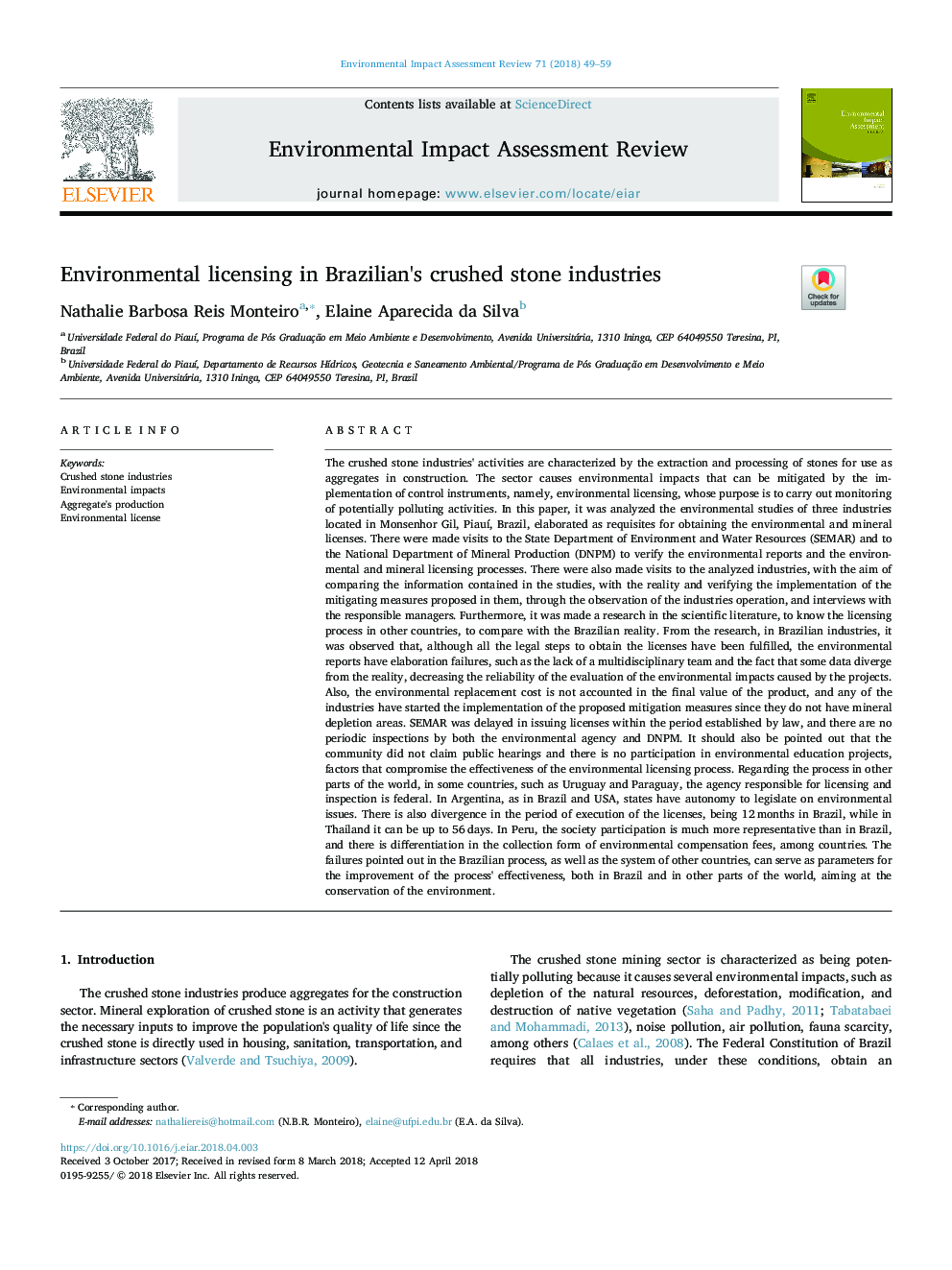| کد مقاله | کد نشریه | سال انتشار | مقاله انگلیسی | نسخه تمام متن |
|---|---|---|---|---|
| 7464799 | 1484974 | 2018 | 11 صفحه PDF | دانلود رایگان |
عنوان انگلیسی مقاله ISI
Environmental licensing in Brazilian's crushed stone industries
ترجمه فارسی عنوان
مجوز محیط زیست در صنایع سنگ شکسته برزیل
دانلود مقاله + سفارش ترجمه
دانلود مقاله ISI انگلیسی
رایگان برای ایرانیان
کلمات کلیدی
صنایع سنگ شکن، اثرات زیست محیطی، تولید انبوه، مجوز محیط زیست،
موضوعات مرتبط
مهندسی و علوم پایه
مهندسی انرژی
انرژی های تجدید پذیر، توسعه پایدار و محیط زیست
چکیده انگلیسی
The crushed stone industries' activities are characterized by the extraction and processing of stones for use as aggregates in construction. The sector causes environmental impacts that can be mitigated by the implementation of control instruments, namely, environmental licensing, whose purpose is to carry out monitoring of potentially polluting activities. In this paper, it was analyzed the environmental studies of three industries located in Monsenhor Gil, PiauÃ, Brazil, elaborated as requisites for obtaining the environmental and mineral licenses. There were made visits to the State Department of Environment and Water Resources (SEMAR) and to the National Department of Mineral Production (DNPM) to verify the environmental reports and the environmental and mineral licensing processes. There were also made visits to the analyzed industries, with the aim of comparing the information contained in the studies, with the reality and verifying the implementation of the mitigating measures proposed in them, through the observation of the industries operation, and interviews with the responsible managers. Furthermore, it was made a research in the scientific literature, to know the licensing process in other countries, to compare with the Brazilian reality. From the research, in Brazilian industries, it was observed that, although all the legal steps to obtain the licenses have been fulfilled, the environmental reports have elaboration failures, such as the lack of a multidisciplinary team and the fact that some data diverge from the reality, decreasing the reliability of the evaluation of the environmental impacts caused by the projects. Also, the environmental replacement cost is not accounted in the final value of the product, and any of the industries have started the implementation of the proposed mitigation measures since they do not have mineral depletion areas. SEMAR was delayed in issuing licenses within the period established by law, and there are no periodic inspections by both the environmental agency and DNPM. It should also be pointed out that the community did not claim public hearings and there is no participation in environmental education projects, factors that compromise the effectiveness of the environmental licensing process. Regarding the process in other parts of the world, in some countries, such as Uruguay and Paraguay, the agency responsible for licensing and inspection is federal. In Argentina, as in Brazil and USA, states have autonomy to legislate on environmental issues. There is also divergence in the period of execution of the licenses, being 12â¯months in Brazil, while in Thailand it can be up to 56â¯days. In Peru, the society participation is much more representative than in Brazil, and there is differentiation in the collection form of environmental compensation fees, among countries. The failures pointed out in the Brazilian process, as well as the system of other countries, can serve as parameters for the improvement of the process' effectiveness, both in Brazil and in other parts of the world, aiming at the conservation of the environment.
ناشر
Database: Elsevier - ScienceDirect (ساینس دایرکت)
Journal: Environmental Impact Assessment Review - Volume 71, July 2018, Pages 49-59
Journal: Environmental Impact Assessment Review - Volume 71, July 2018, Pages 49-59
نویسندگان
Nathalie Barbosa Reis Monteiro, Elaine Aparecida da Silva,
